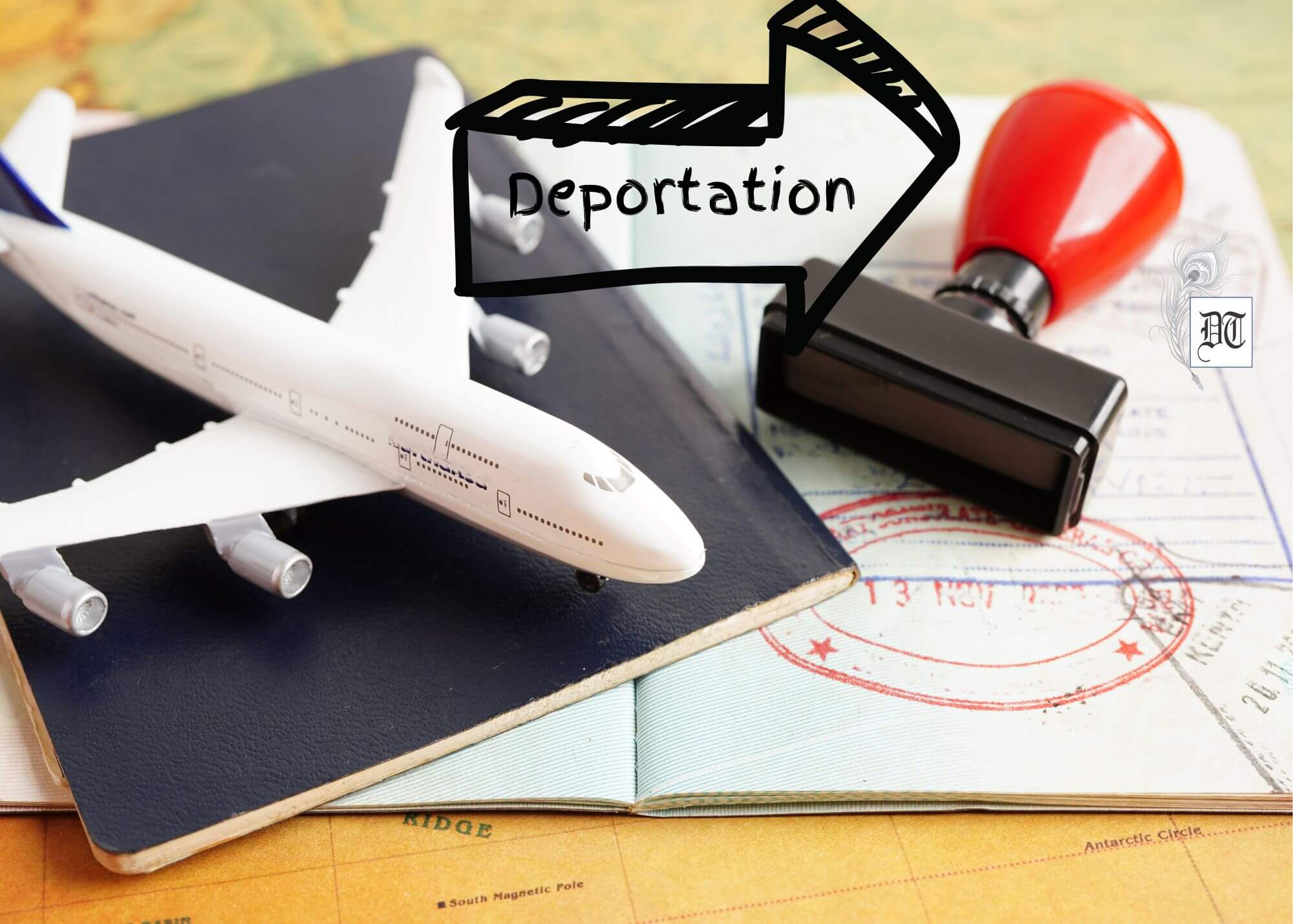Dr Dhiraj explains deportation, its historical perspective and global ramifications, brought about by the forced removal of individuals from a country they do not have the legal right to reside in, exclusively for Different Truths.
Deportation is the process of removing individuals from a country when they do not have the legal right to stay. It has been a widely practised policy for centuries, used by governments to control immigration, protect jobs, and maintain national security. Deportation is not a new practice; it has been used for centuries by governments to control populations. In ancient times, rulers expelled criminals, political opponents, or unwanted groups to maintain order. The concept of forced exile is deeply rooted in various cultural and philosophical traditions, including Indian mythology, Western political thought, and colonial history.
Deportation in the Past
As per the Indian sacred scriptures, exile is often portrayed as both a punishment and a moral trial. The Ramayana narrates the story of Lord Rama, the rightful heir to the throne, who was exiled for fourteen years due to political intrigue. Though not deportation in the modern legal sense, his exile reflects displacement, duty, and governance themes. Similarly, in The Mahabharata, the Pandavas are forced into exile as part of a political settlement, demonstrating how banishment was historically used as a tool for conflict resolution and social control.
The idea of forced removal was also present in ancient Western societies. The Roman Empire frequently employed exile as a punishment for political dissidents, military traitors, and those accused of crimes against the state (Osgood, 2006). Notable figures, including the poet Ovid, were banished for offending the political authorities, a theme reflected in his exile poetry (Williams, 1994). In Athens, the practice of ostracism allowed citizens to vote for the expulsion of individuals deemed a threat to democracy, forcing them to leave the city-state for a decade (Lintott, 1990). These historical examples highlight how exile, whether voluntary or coerced, has long been a mechanism for maintaining political and social order.
Western philosophy also addresses the regulation of movement and state control over citizens. Aristotle, in Politics (Book III), argued that a well-governed city-state must regulate who enters and exits to maintain stability. The modern concept of deportation aligns more closely with Hobbesian ideas of state sovereignty, as articulated in Leviathan, where the government has absolute authority over its territorial integrity (Hobbes, 1996).
During the colonial era, deportation became a systematic tool of empire-building. The British Empire, for example, transported thousands of convicts to penal colonies in Australia in the 18th and 19th centuries as part of its efforts to populate and control distant territories (Hughes, 1987). Similarly, the French government used penal colonies like Devil’s Island in French Guiana to deport criminals and political prisoners, often under brutal conditions (Brown, 2017).
Deportation was not limited to criminals; colonial powers also expelled entire communities for political, economic, or racial reasons. The British forcibly relocated Indian labourers to plantations in the Caribbean, Africa, and Southeast Asia under the indentured labour system, a practice that blurred the lines between deportation and forced migration (Tinker,1974). Similarly, the Russian Empire and later the Soviet Union engaged in mass deportations of ethnic groups, including Crimean Tatars, Chechens, and Volga Germans, to Siberia and Central Asia to eliminate perceived threats to state security (Applebaum, 2003). These historical deportations reveal how forced removals were often driven by both economic exploitation and political control.
Deportation in the Present
In modern times, deportation has been used for various reasons, including national security, economic protection, and political repression. Governments worldwide enforce strict immigration laws, leading to the forced removal of illegal undocumented migrants for various reasons, including economic protection, national security, and political repression.
The forced removal of Japanese Americans to internment camps during World War II is one of the most infamous cases in US history. Although these individuals were American citizens, many were later deported to Japan due to fear of espionage and national security concerns (Ngai, 2004). Across Europe, nations such as Germany and France frequently deport illegal migrants who fail to secure legal status. Germany enforces deportation policies for rejected migrants from countries deemed safe for return, such as Albania and Serbia (Bundesamt für Migration und Flüchtlinge, 2022). France has also taken a strong stance against illegal migration, frequently dismantling illegal migrant camps and repatriating individuals without proper documentation.
In the United Kingdom, illegal migration remains a contentious issue. The UK government has implemented measures such as the Hostile Environment policy, designed to make it difficult for undocumented illegal migrants to access public services and employment (Goodfellow, 2019). The controversial Rwanda deportation plan, which proposed sending certain undocumented migrants to Rwanda instead of allowing them to stay in the UK, sparked legal and ethical debates (BBC, 2023).
Australia enforces one of the strictest anti-illegal migration policies in the world. Under its offshore detention program, unauthorized illegal migrants attempting to enter the country by sea are sent to detention centres on Nauru and Manus Island, with little chance of settlement in Australia (UNHCR, 2021). The government argues that such measures deter human trafficking and illegal entry.
Asian countries also grapple with illegal migration. Malaysia, for instance, regularly conducts raids to identify and deport illegal undocumented workers, many of whom originate from Indonesia, Bangladesh, and Myanmar. The country has faced criticism for its harsh detention conditions and mass deportations (Human Rights Watch, 2022). Similarly, Saudi Arabia has periodically deported thousands of illegal migrants, particularly workers from Ethiopia, Yemen, and South Asia, as part of labour market regulations and national security policies.
In Latin America, Venezuela’s economic crisis led to mass migration, with neighbouring countries such as Colombia, Peru, and Ecuador struggling to regulate the influx. While many illegal migrants seek legal status, thousands remain undocumented, often facing deportation when caught without proper papers. The Dominican Republic has also implemented strict deportation policies against Haitian migrants, many of whom enter the country illegally seeking work.
The United States has also intensified its measures against undocumented migrants, with thousands being deported annually. In a recent case, a U.S. military aircraft carried 104 undocumented illegal Indian migrants back to India, marking the first instance of such an operation. This reflects the country’s evolving immigration enforcement strategies and has sparked political debates regarding the treatment of deported individuals. Between October 2023 and September 2024, over 1,100 undocumented illegal Indian migrants were deported (Department of Homeland Security, 2024). The new Trump administration has strengthened border security, increased deportations, and reduced work and student visa allocations to curb illegal migration. The Biden administration upheld many of these measures, leading to a steady increase in deportations of Indian nationals over the last few years (Meissner, 2020).
India’s Deportation Policies and the Rest of the World
India faces its immigration challenges, particularly with illegal migration from Bangladesh. Economic hardship and porous borders have resulted in a significant influx of Bangladeshi migrants into Indian states like Assam and West Bengal. This migration has led to political and social tensions, with locals fearing job competition and resource depletion (Sarma, 2019). The Indian government introduced the National Register of Citizens (NRC) to identify and deport illegal immigrants, but Bangladesh has often refused to accept deported migrants (Chakrabarty, 2021). India recently intensified deportation efforts by working with border security agencies to track and repatriate undocumented migrants.
Similar challenges exist worldwide. Greece and Italy struggle with illegal migration from Africa and the Middle East, with deportations being a common response. The UK enforces strict immigration laws, deporting illegal migrants from Pakistan and Afghanistan (Goodfellow, 2020). These cases highlight the global nature of deportation, influenced by economic conditions, diplomatic relations, and border control policies. As deportation policies continue to evolve, both sending and receiving countries must navigate the complex legal and humanitarian challenges associated with migration.
India’s deportation framework differs significantly from that of Western nations. The U.S. enforces strict deportation laws under the Immigration and Nationality Act, enabling immediate removal of illegal immigrants. In contrast, India’s deportation process, governed by the Foreigners Act of 1946, involves lengthy legal proceedings and diplomatic negotiations (Chakrabarty, 2021).
While the US operates large detention centres for illegal migrants, India lacks such infrastructure, making enforcement challenging. India, however, does not have any formal policy and addresses deportation on a case-by-case basis. China employs a no-tolerance policy, swiftly deporting illegal immigrants without legal delays (Triandafyllidou, 2018). The disparity in deportation policies underscores how different nations balance security concerns with humanitarian obligations, resources, and diplomatic considerations.
The Human Aspect of Deportation
Deportation has profound human consequences, often tearing families apart and leaving individuals financially devastated. Many deportees incur significant debts to fund their migration journeys, only to be sent back empty-handed. Human smuggling networks exploit desperate migrants, leading to cases of abuse, trafficking, and even death.
Beyond economic hardships, deported individuals face social stigma in their home countries. Many struggle to reintegrate due to a lack of job opportunities, psychological trauma, and in some cases, hostility from their communities. Children separated from deported parents experience emotional distress, academic disruptions, and social instability. To address these challenges, countries must explore alternative policies, such as creating legal pathways for migration, improving economic conditions to reduce forced migration, strengthening anti-smuggling efforts, and ensuring deportation processes uphold human rights and dignity.
Conclusion
Deportation remains a complex and contentious issue worldwide. Across history and cultures, exile and deportation have served as mechanisms of governance. While Indian mythology often frames exile as a test of moral and spiritual endurance, Western thought has historically viewed deportation as a legal and political necessity. The modern challenge is balancing state sovereignty with human rights considerations, ensuring that deportation policies do not violate fundamental principles of dignity and fairness. The increasing use of deportation as a policy tool reflects broader global concerns about security, labour markets, and national identity, making it a complex issue requiring nuanced solutions.
The recent deportation of Indian migrants from the US highlights the tightening of immigration policies, while India faces challenges with illegal migration from Bangladesh. Similar deportation trends are evident in Europe and Southeast Asia, revealing a global struggle between border security and humanitarian considerations. To create effective and humane immigration policies, governments must focus on long-term solutions, including economic development, legal migration channels, and international cooperation. While every nation has the right to regulate immigration, it is crucial to ensure that deportation processes are fair and uphold human dignity.
References
1. Applebaum, A. (2003). Gulag: A history. Doubleday.
2. BBC. (2023). Rwanda asylum plan: Controversial UK migrant deportation policy explained. Retrieved from https://www.bbc.com
3. Brown, M. (2017). The penal colony: Devil’s Island and the birth of France’s overseas penitentiary system. Oxford University Press.
4. Bundesamt für Migration und Flüchtlinge. (2022). Asylum and deportation policies in Germany. Retrieved from https://www.bamf.de
5. Chakrabarty, B. (2021). The politics of citizenship in India. Routledge.
6. Department of Homeland Security. (2024). Annual report on immigration enforcement. US Government Printing Office. Retrieved from https://www.dhs.gov
7. Goodfellow, M. (2019). Hostile environment: How immigrants became scapegoats. Verso Books.
8. Hernández, K. L. (2006). Migra! A history of the US Border Patrol. University of California Press.
9. Hobbes, T. (1996). Leviathan (R. Tuck, Ed.). Cambridge University Press. (Original work published 1651).
10. Hughes, R. (1987). The Fatal Shore: The epic of Australia’s founding. Alfred A. Knopf.
11. Human Rights Watch. (2022). Malaysia: Crackdown on undocumented workers. Retrieved from https://www.hrw.org
12. Lintott, A. (1990). The concept of ostracism in ancient Athens. Classical Quarterly, 40(1), 54-77.
13. Meissner, D. (2020). Immigration enforcement in the United States: The rise in deportations. Migration Policy Institute.
14. Ngai, M. M. (2004). Impossible subjects: Illegal aliens and the making of modern America. Princeton University Press.
15. Osgood, J. (2006). Caesar’s legacy: Civil War and the emergence of the Roman Empire. Cambridge University Press.
16. Sarma, H. (2019). Illegal immigration and demographic changes in Assam: A policy analysis. Economic and Political Weekly, 54(22), 45-56.
17. Tinker, H. (1974). A new system of slavery: The export of Indian labour overseas, 1830-1920. Oxford University Press.
18. Triandafyllidou, A. (2018). Migrant smuggling: Irregular migration in Europe and beyond. Springer.
19. UNHCR (United Nations High Commissioner for Refugees). (2021). Offshore detention and international refugee law: The case of Australia. Retrieved from https://www.unhcr.org
20. Williams, G. (1994). Banished voices: Readings in Ovid’s exile poetry. Cambridge University Press.
Picture design by Anumita Roy





 By
By
 By
By
 By
By
 By
By
This is a beautiful write-up that goes into the history of deportation, refugee crisis and moral-ethical dilemmas associated with deportation. In fleshing out instances of deportation in the past, you’ve contextualised the deportation in the present times really well.
People leaving their native countries and entering alien lands illegally without proper papers, getting deported and ill-treated raise two important issues; one, why do they leave the comforts of their own native lands; two, is the world truly a global village as it is often made out to be? Last question that is much more troubling; who were the original inhabitants of the Americas before the white ‘Pilgrim Fathers’ and outlaws colonised the Americas?
Very well-written piece, Dr. Dhiraj. Keep it up.
Thank you so much Dr Sahib for your kind and encouraging words. Thanks for your thoughtful insights and the important questions you have raised. The idea of a global village versus the reality of borders and deportations is indeed something to think about. I am very glad sir that you found the article meaningful. Your motivation means a lot to me. Regards.